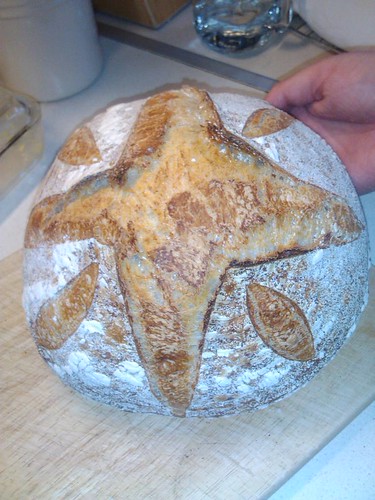1. Take 100g strong flour and 100g tepid (preferably filtered)
water and mix together in a clean glass jar. measure into a
glass jar (see through is best so you can see what’s going on).
2. Add 6-8 raisins to kick start the the starter – you need to
remove these once your starter is alive and bubbling.
3. Cover your jar with something breathable and leave for 24
hours at room temperature. At the end of the first 24 hours,
and whether or not the starter has started to bubble, add
another 100g flour and 100g water and stir vigorously to
combine.
4. Leave for a further 24-72 hours, or until you notice plenty
of bubbles forming through the mixture, and a definite increase in volume. At this point, you will
then need to discard three quarters of your starter, and refresh with another 100g flour, and 100g
water.
5. At this point, you can leave the starter at room temperature, but you must discard half and refresh
as above, every day. I find it easier to keep it in the fridge where it will happily thrive as long as
you feed it every 1-2 weeks. (I've left mine for 3 weeks on occasions, and it's always sprung back
to life when I've discarded and refreshed again).
6. When you want to use your starter to make bread, either discard and refresh 12 hours prior to
using, or if kept in the fridge, take it out and let it slowly come to room temperature before
discarding and refreshing. Once refreshed and bubbly, I take 85g of starter and mix with 125g flour
and 125g water, in a clean container (this mix is called a “levain”); I usually do this the night before
I want to bake with it. If left for 12-16 hours, the levain will rise and look bubbly and aerated – this
is perfect for making good bread.
How to make a classic sourdough loaf
Ingredients
375g strong white bread flour
250g sourdough levain (made at least 12 hours ahead)
7g fine sea salt
130 – 175mls tepid water
Olive oil, for kneading
Preparation method
Combine the flour, starter and salt in a large mixing bowl. Add the water, a little at a time, and mix
with your hands to make a soft dough – you may not need all of the water.
Coat a work surface with olive oil, then get kneading the dough for 10-15 minutes, or until the
dough becomes smooth and elastic
Tip the dough into a lightly oiled bowl and cover with cling film. Leave to rise in a warm place for
six hours, or until at least doubled in size.
Knock back the dough gently, and roll into a ball and dust with flour. Leave to rest for 20 minutes
before kneading again gently, and smoothing the dough on your work surface until you create
surface tension on the dough. Place seam side up into a well floured proving basket, and place in
the fridge overnight to prove slowly.
The next morning, get the dough out the fridge and allow to come to room temperature. Put a tray
half filled with water on the bottom oven shelf and preheat the oven to 220C/425F/Gas 7.
Gently tip the risen dough onto a lined baking tray. Bake the loaf for 30 minutes at this heat, then
reduce the heat to 200C/400F/Gas 6 and bake for a further 15-20 minutes. Cool on a cooling rack.




































